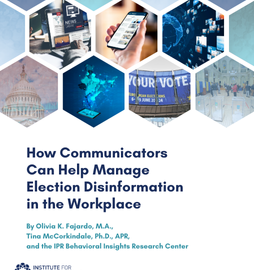This blog is provided by the IPR Behavioral Insights Research Center. The Institute for Public Relations Behavioral Insights Research Center (BIRC) recently published a guide, “How Communicators Can Help Election Disinformation in the Workplace” to help global communication leaders identify and manage election disinformation in the workplace. Disinformation is defined as deliberately misleading or false … Continue reading How Communicators Can Combat Disinformation in Elections










